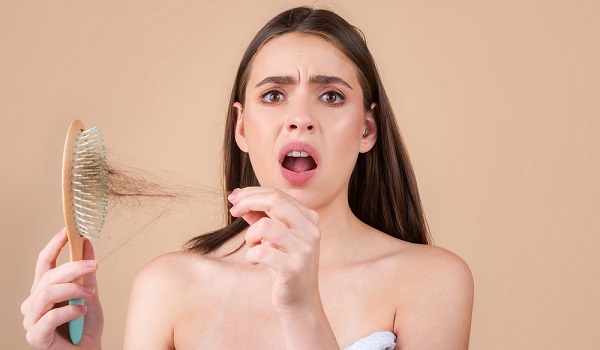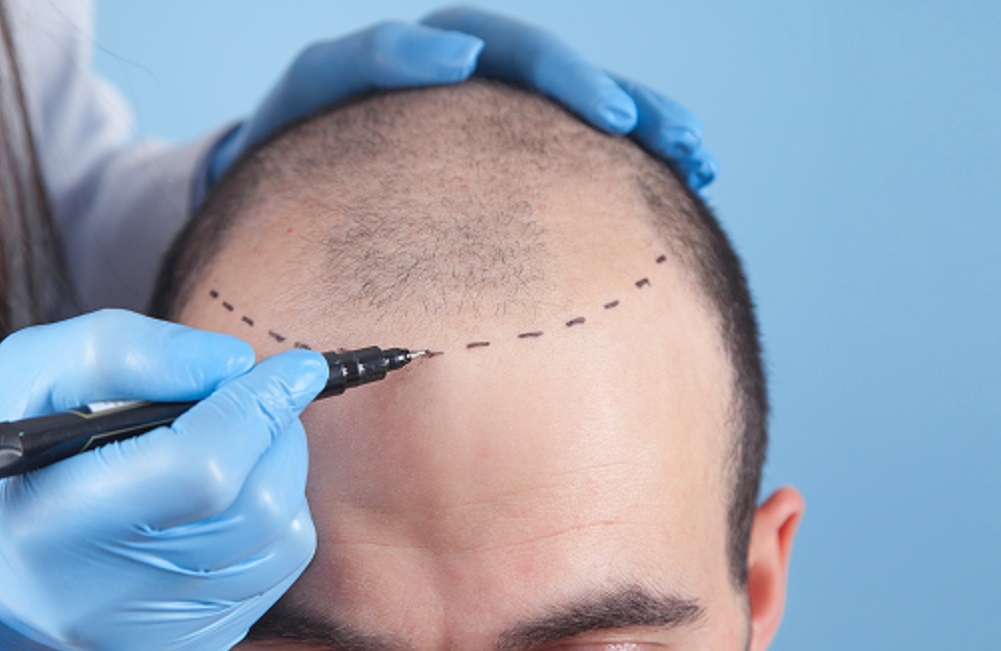What is
Hair loss (alopecia)?
Hair loss, medically known as alopecia, is a common dermatological problem that affects people of all ages. It leads to partial or complete loss of head and body hair. Causes can be genetic predisposition, hormonal disorders, stress, autoimmune diseases or certain medications. Hair loss can have both physical and psychological effects, which can affect the quality of life and self-confidence of those affected. Various treatments, such as drug therapies or hair transplants, can be used depending on the cause and severity.
About the symptoms
More information
Important facts about hair loss
Definition of hair loss (alopecia)
Hair goes through a cyclical growth process consisting of the long anagen phase (2 to 6 years), the short catagen phase (3 weeks) and the telogen phase (2 to 3 months). At the end of the resting phase, usually at around 50 to 100 hairs per day, these fall out while new hairs grow in the follicle and the cycle begins again. Hair loss can be caused by various disorders of the growth cycle, such as anagen effluvium, which triggers hair loss in the growth phase, or telogen effluvium, in which more than 100 hairs a day enter the resting phase and fall out. Hair loss can be focal (limited to a part of the scalp) or diffuse (widespread) and can be classified with or without scarring.
How often does hair loss occur?
Hair loss is a widespread problem and occurs in many people. The frequency of hair loss can vary depending on age, gender, genetic predisposition and other factors. It is important to note that some degree of hair loss is normal throughout life as hair grows and falls out in cycles. The so-called "male pattern" of hair loss, also known as androgenetic alopecia, is more common in men. It affects about two-thirds of men aged 35 and about 85% of men aged 50. Women can also be affected by hair loss, but the distribution of hair loss is often different in women and diffuse hair loss is more common. Overall, hair loss can occur in different forms in both sexes and can be caused by various factors such as genetic predisposition, hormonal changes, stress, certain medications or illnesses.
What are the causes and forms of hair loss?
There are various causes and forms of hair loss.
It is important to identify the specific cause of hair loss as this will influence the treatment. A dermatologist can help to make an accurate diagnosis and suggest a suitable treatment.
Androgenetic alopecia
Androgenetic alopecia
Also known as "male" or "female" pattern hair loss. It is the most common form of hair loss and results from a genetic predisposition and hormonal influences.
Telogen effluvium
Telogen effluvium
A temporary form of hair loss that can be triggered by stress, hormonal changes, illness or certain medications.
Anagen effluvium
Anagen effluvium
Hair loss in the growth phase, often caused by chemotherapy or radiation.
Alopecia areata
Alopecia areata
An autoimmune disease in which the body attacks its own hair follicles, resulting in round bald patches.
Alopecia totalis/universalis
Alopecia totalis/universalis
Complete hair loss on the scalp or the whole body.
What to do with hair loss
The choice of treatment depends on the type of hair loss and the individual needs of the person affected. It is advisable to consult a dermatologist or trichologist to obtain an accurate diagnosis and determine the appropriate treatment option. Early treatment can help to slow down the progression of hair loss and promote hair growth.
Stress management and healthy eating
Stress can exacerbate hair loss, so it is important to reduce stress and practice relaxation techniques. Hair growth and the effectiveness of treatments can take time, so be patient and consistent in applying the recommended therapies. In addition, a balanced diet rich in vitamins, minerals and proteins can help to support hair health.
Drug treatment for hair loss
Hair loss varies in form and cause. The treatment depends on the trigger. Various options are available to combat this. Topical therapies such as creams, lotions or foams are applied directly to the scalp to promote hair growth and stop hair loss. Sometimes systemic therapy is also necessary: medication is taken orally to treat hair loss from the inside out and stimulate growth.
Mesotherapy for hair loss
Another option is mesotherapy, in which low-dose substances are injected directly into the scalp. This method can stimulate hair growth and strengthen the hair follicles.
Sources
Please note that all content provided regarding individual medical conditions, treatments, procedures, etc. is general information and may vary depending on the physician:in and individual case and initial situation.
For more detailed information, please always consult your doctor.
Wolff H, Fischer TW, Blume-Peytavi U. Diagnosis and therapy of hair and scalp diseases. Dtsch Ärztebl 2016; 113: 377-86. doi:10:3238/arztebl.2016.0377
/www.aerzteblatt.deGerman Dermatological Society. Tinea capitis. AWMF Guideline No. 013-033. S1, status 2019
www.awmf.orgKanti V, Messenger A, Dobos G. Evidence-based (S3) guideline for the treatment of androgenetic alopecia in women and in men - short version. J Eur Acad Dermatol Venereol. 2018 Jan;32(1):11-22.
www.wiley.comForms, causes and treatment of hair loss, Gesundheit.gv.at. (Last call 24.08.2023)
www.gesundheit.gv.at